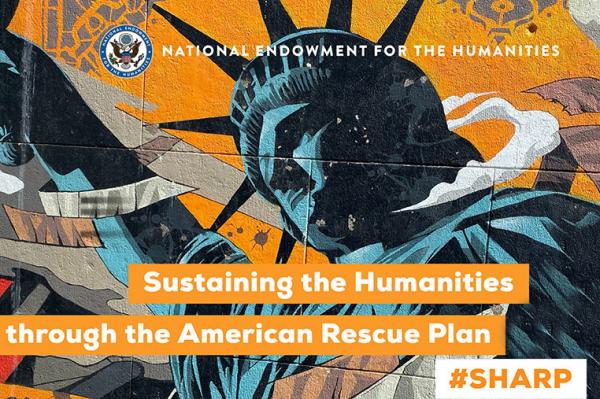NEH Announces American Rescue Plan Funding for State and Jurisdictional Humanities Councils
$52.6 million in funding to NEH’s partner network of local humanities councils will provide emergency economic relief to cultural and educational programs and organizations across the country


WASHINGTON, D.C. — The National Endowment for the Humanities (NEH) today announced it has distributed $52.6 million in funding to the 56 state and jurisdictional humanities councils and interim partners, the agency’s first awards under the American Rescue Plan (ARP) Act of 2021. These funds will support humanities organizations, programs, and professionals at the local level, advancing economic recovery within a cultural sector devastated by the COVID-19 pandemic. A state-by-state breakdown of funding to each humanities council is available here.
“With so many of our nation’s cultural and educational institutions reeling from the economic fallout of the pandemic, NEH’s state and jurisdictional humanities partners are on the front lines of the crisis, adapting and responding to urgent needs within their states and communities to shore up the humanities organizations and resources that enrich the lives of so many citizens,” said NEH Acting Chairman Adam Wolfson. “NEH is grateful to our state and jurisdictional partners for joining us in this effort to quickly distribute American Rescue Plan relief funding to where it is most needed.”
This new funding, which represents approximately 40 percent of the American Rescue Plan program funds allocated to NEH by the American Rescue Plan, will be regranted by NEH’s 56 state and jurisdictional partners to support cultural groups and public and educational humanities programming across the country. Each council will determine their own process and timing for awarding these funds. Consult your local humanities council for ARP funding opportunities in your region.
“Our member councils are honored and eager to once again work closely with NEH to deliver urgently-needed aid that will support our nation’s humanities infrastructure,” said Phoebe Stein, president of the Federation of State Humanities Councils, the membership organization of the state and jurisdictional humanities councils. “For nearly half a century, the state and jurisdictional councils have provided grants to support capacity-building initiatives and public programming at humanities organizations large and small across their states and territories. This experience, combined with councils’ robust networks and deep knowledge of the individuals and communities they serve, will ensure that ARP funding is delivered effectively to organizations that need it the most—across rural, suburban, and urban areas—and in a way that has the greatest positive impact on their communities.”
Since the beginning of the pandemic, NEH’s state partners have responded quickly to the unprecedented needs of humanities organizations suffering from the impact of COVID-related program closures, lost revenue, and budget shortfalls. With funding from NEH provided by the Coronavirus Aid, Relief, and Economic Security (CARES) Act of 2020, the councils distributed $30 million in emergency funding to more than 4,500 humanities groups, programs, and organizations in all 50 states and U.S. territories, resulting in the retention of approximately 12,000 at-risk jobs and the creation of an additional 1,200 new jobs in the humanities. These awards have proved vital in sustaining the country’s humanities infrastructure, providing much-needed support to the nation’s libraries, historical societies, museums, colleges, heritage sites, preservation groups, humanities centers and festivals, and other small cultural non-profits at the heart of vibrant communities and local economies.
In addition, during a year of social distancing, humanities councils created virtual programs to connect people online and alleviate isolation within their communities through discussion of the humanities. Within the first few weeks of the pandemic, programs such as Humanities Washington’s Cabin Fever Questions, Humanities New York’s “couch conversations,” Delaware Humanities’s Distant Discussions, Montana Humanities’s Montana Conversations, and Humanities Guåhan’s Community Conversations provided forums for residents to share their experiences and adjust together to the new realities of life during a pandemic. Letter-exchange campaigns at Oregon Humanities, Humanities Nebraska, and Idaho Humanities Council, and Humanities Kansas’s Humanities Hotline helped foster connections among community members to each other and to the history and heritage of their state. And resources like the Alabama Humanities Alliance’s Aha! Moments in Education, Humanities Texas’s online teacher institutes, Oklahoma Humanities’s BrainBox podcast, Indiana Humanities’s Sound Bites, and Humanities Washington’s Cabin Fever Kids have provided educational enrichment opportunities for homebound families and students engaged in remote learning. These are a few examples of hundreds of council-conducted or -supported programs happening across the country. Visit your state or jurisdictional humanities council website to learn about programs available in your community or online.
This new funding to local humanities councils is part of NEH’s commitment to Sustaining the Humanities through the American Rescue Plan (#SHARP), and is funded by a $135 million supplement allocated to NEH by the ARP. Also included in this effort are two SHARP funding opportunities designed to support the economic recovery of cultural organizations and educational institutions adversely impacted by the coronavirus pandemic: the American Rescue Plan: Humanities Organizations and American Rescue Plan: Grantmaking grant programs. Funding awards in these two categories will be announced in September.
National Endowment for the Humanities: Created in 1965 as an independent federal agency, the National Endowment for the Humanities supports research and learning in history, literature, philosophy, and other areas of the humanities by funding selected, peer-reviewed proposals from around the nation. Additional information about the National Endowment for the Humanities and its grant programs is available at neh.gov.